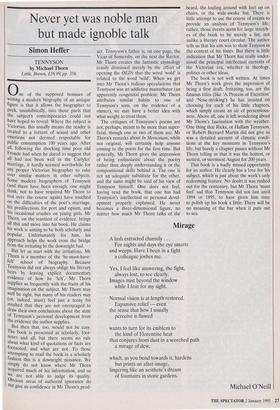Never yet was noble man but made ignoble talk
Simon Heifer
TENNYSON by Michael Thorn
Little, Brown, £16.99, pp. 356
One of the supposed bonuses of writing a modern biography of an antique figure is that it allows the biographer to peek, uninhibitedly, into those parts that the subject's contemporaries could not have hoped to reveal. Where the subject is Victorian, this usually means the reader is treated to a torrent of sexual and other emotions not deemed respectable for Public consumption 100 years ago. After all, following the shocking time poor old Proude had when he dared to suggest that all had not been well in the Carlyles' marriage, it hardly seemed worthwhile for any proper Victorian biographer to rake over similar matters in other subjects. Some modern biographers of Tennyson (and there have been enough, one might think, not to have required Mr Thorn to trot over the course again) have touched Oil the difficulties of the poet's marriage, his predilections for port and opium, and his occasional crushes on young girls. Mr Thorn, on the scantiest of evidence, brings all this and more into his book. He claims his work is aiming to be both scholarly and Popular. Unfortunately for him, his approach helps the work cross the bridge from the irritating to the downright bad.
But let us start with the irritations. Mr Thorn is a member of the 'he-must-have- felt' school of biography. Because Tennyson did not always oblige his literary heirs by leaving explicit documentary evidence of how he 'felt', Mr Thorn supplies us frequently with the fruits of his imagination on the subject. Mr Thorn may well be right, but many of his readers may (or, indeed, must) feel just a teeny bit insulted that they are not encouraged to draw their own conclusions about the state of Tennyson's personal development from the evidence the author supplies.
But then that, too, would not be easy. The book is presented as scholarly, foot- notes and all, but there seems no rule about what kind of quotations or facts are footnoted, and what are not. To those attempting to read the book in a scholarly fashion this is a downright nuisance. We simply do not know where Mr Thorn acquired much of his information, and so we are not able to judge its quality. Obvious areas of authorial ignorance do not give us confidence in Mr Thorn's prod- uct. Tennyson's father is, on one page, the Vicar of Somersby, on the next the Rector. Mr Thorn creates the fantastic etymology (easily dismissed merely by the effort of opening the OED) that the word *old' is related to the word 'wild'. When we get into Mr Thorn's tedious speculations that Tennyson was an addictive masturbator (an apparently congenital problem: Mr Thorn attributes similar habits to one of Tennyson's sons, on the evidence of a stutter), we may have a better idea with what weight to treat them.
The critiques of Tennyson's poems are not, perhaps, meant to be more than super- ficial, though one or two of them are; Mr Thorn's remarks about In Memoriam, while not original, will certainly help anyone coming to the poem for the first time. But generally, Mr Thorn gives the impression of being enthusiastic about the poetry rather than deeply understanding it or the compositional skills behind it. The one is not an adequate substitute for the other, and the same might be said of his view of Tennyson himself. One does not feel, having read the book, that one has had Tennyson's intellectual or personal devel- opment properly explained. He never becomes a three-dimensional figure, no matter how much Mr Thorn talks of the
beard, the loafing around with feet up on chairs, or the wide-awake hat. There is little attempt to use the course of events to provide an analysis of Tennyson's life; rather, those events seem for large stretch- es of the book to be merely a list, not unlike a literary court circular. The author tells us that his aim was to show Tenyson in the context of his times. But there is little indication that Mr Thorn has really under- stood the principal intellectual currents of the Victorian era, whether in theology, politics or other ideas.
The book is not well written. At times Mr Thorn's work gives the impression of being a first draft. Irritating, too, are the fatuous titles (like 'A Process of Excretion' and `Nose-stroking') he has insisted on choosing for each of his little chapters, which simply create an air of pretentious- ness. Above all, one is left wondering about Mr Thorn's fascination with the weather. One thing that Ricks, or Hallam Tennyson, or Robert Bernard Martin did not give us was a detailed account of climatic condi- tions at the key moments in Tennyson's life; but barely a chapter passes without Mr Thorn telling us that it was the hottest, or wettest, or stormiest August for 200 years.
This book is a badly missed opportunity for its author. He clearly has a love for his subject, which is just about the work's only redeeming feature. No doubt it was rushed out for the centenary, but Mr Thorn 'must feel' sad that Tennyson did not last until 1894 or 1895, to have given him time to polish up his book a little. There will be no moaning of the bar when it puts out to sea.










































 Previous page
Previous page